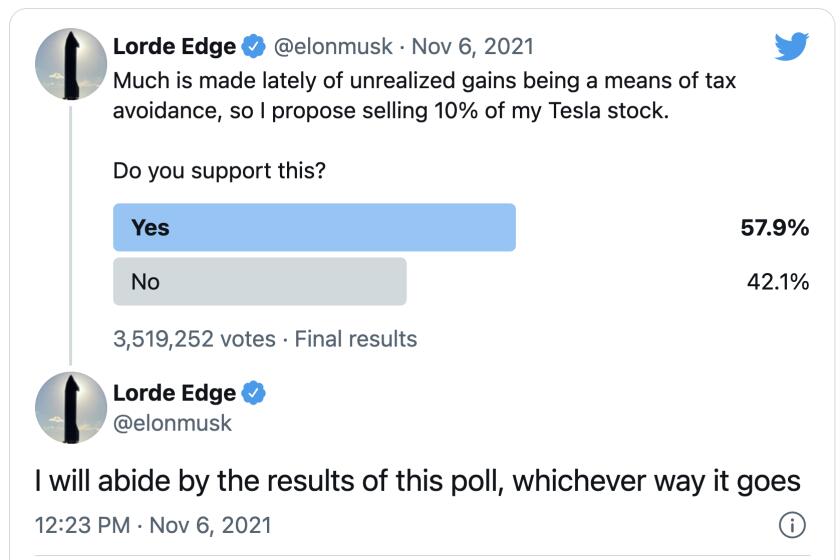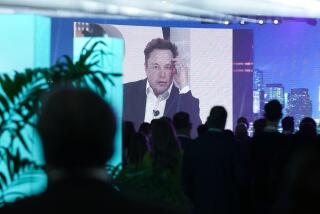Column: Elon Musk’s stake in Twitter is not good news for Twitter — or its users

- Share via
Over the years, Elon Musk has used Twitter to flout securities laws, smear his critics and promote useless treatments for COVID-19.
So of course Twitter judged that Musk “would bring great value to our Board.”
That’s how Twitter Chief Executive Parag Agrawal justified the company’s appointing Musk to its board of directors Tuesday.
Through conversations with Elon in recent weeks, it became clear to us that he would bring great value to our Board.
— Twitter Chief Executive Parag Agrawal
Agrawal further described Musk as “both a passionate believer and intense critic of the service which is exactly what we need on Twitter, and in the boardroom, to make us stronger in the long-term.”
Speaking as a devoted and long-term user of Twitter, I can only respond, “that depends.” One can be an intense critic of a company yet have only ideas that will make it worse, and weaker.
Get the latest from Michael Hiltzik
Commentary on economics and more from a Pulitzer Prize winner.
You may occasionally receive promotional content from the Los Angeles Times.
Agrawal’s announcement glossed over what’s probably the real reason he invited Musk onto the Twitter board: A day earlier, Musk disclosed that he had accumulated a 9.2% stake in the company. That made Musk, who already was among Twitter’s largest users, with more than 80 million followers, Twitter’s largest shareholder.
Any shareholder with that much heft is going to make his views known to management in a way that would be impossible to ignore, so from Agrawal’s vantage point, it was probably just as well that Musk be on the inside than on the outside looking in.
It’s proper to observe that Musk may not have been entirely candid about his intentions for Twitter.
He disclosed his ownership stake on the Securities and Exchange Commission’s schedule 13G, which is typically used by shareholders intending to play a passive role in the subject company; investors buying stakes to play an active role, such as seeking control, generally disclose on schedule 13D, which is more detailed and requires more prompt disclosures of changes in shareholdings and intentions.
Elon Musk thinks tax policy is a game. He should be made to pay.
Musk also checked a box on the 13G form designating himself as a “passive investor.”
It’s possible that Musk never intended to be more than a passive investor, but Agrawal offered him a board seat unbidden.
Agrawal did disclose, however, that he had held discussions with Musk, apparently about his joining the Twitter board, for “weeks.” It’s also worth noting that Agrawal did extract a written commitment from Musk not to increase his holdings beyond 14.9% as long as he’s on the board and for 90 days after he leaves.
It’s also possible that Musk is testing the SEC’s determination to force him to comply with its regulations, a practice that has made him a thorn in the agency’s side for years.
Even if Musk posed as a passive investor in Twitter before, he’s no longer claiming to be passive about changes he wishes to see in Twitter: After the announcement of the board appointment, he tweeted that he’s “looking forward to working with Parag & Twitter board to make significant improvements to Twitter in coming months!”
Notwithstanding his outsized following, not much in Musk’s history with Twitter suggests that his ideas are certain to make it stronger. As a social media platform, Twitter has some notable flaws. Because Twitter’s policing of its users’ tweets has been indifferent and ineffectual, the platform often resembles an online version of an open sewer line.
It seems to take a large flow of hateful and noxious content to get a user suspended or banned, especially a prominent user such as a national politician. Donald Trump exploited Twitter to broadcast lies and other offensive material for years until he finally was permanently banned after the Jan. 6, 2021, insurrection for violating the service’s strictures against the “glorification of violence.”
On a more positive level, the characteristic that makes Twitter useful to subscribers is that one’s Twitter feed can be curated. Users can designate accounts they wish to follow.
Elon Musk complains about California’s regulations — but they’ve put billions of dollars in his pocket.
That doesn’t guarantee that obnoxious tweets won’t show up in one’s feed, since trusted users sometimes retweet offensive tweets for the purpose of commenting on or ridiculing them, and those tweets can infiltrate one’s feed in other ways. But it does give users some measure of control over what they see.
Twitter has acknowledged its own responsibility to try to stamp out hate and threatening speech, abusive tweets or exhortations to violence, among other infractions of its rules.
Musk has targeted those policies in the past, in part by implying that Twitter’s content moderation practices infringe on free speech. Last month, after he assembled his shareholding stake but before it was disclosed, he tweeted a poll reading: “Free speech is essential to a functioning democracy. Do you believe Twitter rigorously adheres to this principle?” Among his followers who responded, 70.4% said “No.”
That suggests that as a board member, Musk might press for a loosening of content moderation standards. Making Twitter more malodorous might not be good for “a functioning democracy.”
Musk has also advocated allowing users to edit their tweets after posting. The “edit button” idea has always been controversial — co-founder and former Chief Executive Jack Dorsey once said it would probably never be implemented — because it’s unclear that it would be an unalloyed improvement. Although it would allow users to remove typos in their posted tweets, it might also allow them to edit tweets in deceptive ways.
To place Musk’s new role at Twitter in perspective, it’s useful to examine how he has used it in the past. Musk has been such an assiduous tweeter that Twitter has been accepted as a formal source of public disclosures about his companies, including Tesla and SpaceX, of which he is chief executive.
His tweeting, however, has brought him into conflict with the SEC, which has charged that some of his tweets are materially misleading to investors. The most notable case concerns a tweet on Aug. 7, 2018, in which Musk claimed to have “funding secured” to take Tesla private at $420 a share. The stock opened that day at $68.77 and closed at $75.91. As it happened, Musk had not secured funding for the transaction.
The SEC eventually forced Musk to give up his chairmanship of Tesla and Musk and the company to each pay a $20-million penalty. The company also agreed to require Musk to seek its approval before issuing any tweets about Tesla’s business.
Musk and the SEC have since engaged in a lengthy fight over that settlement. Last month, Musk asserted in a legal filing that he entered into the settlement under duress because of the SEC’s implicit threat to damage Tesla’s financial health. The SEC replied that Musk attested at the time in writing that he had settled the case “voluntarily” and that “no threats ... of any kind” had been made by the agency.
Musk also has contended that the settlement infringes on his 1st Amendment right to free speech and that the agency has been engaged in a lengthy campaign of harassment. The SEC says the subpoenas for Tesla and Musk records that Musk finds objectionable reflect “legitimate inquiries as to new potentially violative conduct by Tesla and Musk.”
All that points to the ultimate — and currently unanswerable — question of whether, if you’re a Twitter user, you really want its policies to be influenced, much less dictated, by someone like Elon Musk. The value of his Tesla shares make him the richest man in the world, and even when he wasn’t the richest earthling, he wasn’t known as someone who was especially welcoming to criticism.
Some rich, controlling executives, such as Meta Platform’s Mark Zuckerberg, have led their companies into thickets of difficulty, precisely because they couldn’t be challenged. Even with 14.9% of its stock, Musk won’t have enough control of Twitter to be sure of getting his way. But he sure won’t be a silent partner.
More to Read
Inside the business of entertainment
The Wide Shot brings you news, analysis and insights on everything from streaming wars to production — and what it all means for the future.
You may occasionally receive promotional content from the Los Angeles Times.













